|
Advice article filter
|
Hyperlipemia or diet diseaseNative breeds are well known for becoming overweight quickly. You don’t want your pony to be too fat before you go to a show or grading. Many horse owners put their animals on a diet only a few weeks before the event. This can cause problems: suddenly the pony with a normally healthy appetite starts to refuse feed and stops drinking water. Quick action has to be taken, otherwise this problem will have a sad ending ….. What is Hyperlipemia? Hyperlipemia or diet disease can occur when overweight horses or ponies loose weight too quickly. The animal receives too few nutrients and starts to burn it’s own fat reserves. Because of this, the fat metabolism is disturbed and as a result too much fatty matter gets into the blood. That makes the pony stop eating and drinking. They do put their nose in the drinker but they only rinse their mouth and don’t drink anything. This makes the disease so dangerous, as the non-eating and drinking makes things a great deal worse. Common causes of too fast a weight loss
What to do when Hyperlipemia occurs? As soon as a horse or pony refuses to eat and drink without an obvious reason, you have to call the vet. Hyperlipemia can be fatal if no immediate action is taken. The sick animal needs medication and to be fed through a drip, as it does nor want to eat or drink for itself. Don’t forget that the refusal of food can have other causes as well. How to prevent Hyperlipemia When a horse or pony has a weight problem, make sure that the weight loss is gradual. Do not put a mare in foal on a diet. She should already have the correct weight before she is put in foal. From month 9 of the pregnancy up to and including the 4th month of the lactation period a mare, who is too fat, should get the same amount of feed as if she had the correct weight.  
|

